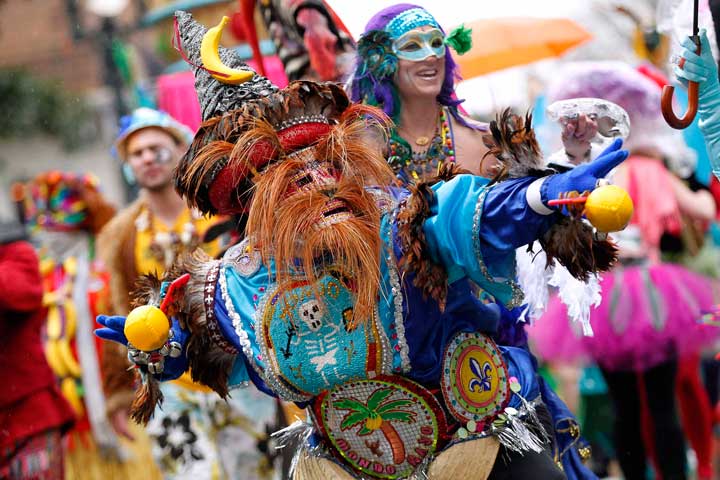
Members of the Mondo Kayo Social and Marching Club parade down St. Charles Avenue on Mardi Gras in New Orleans March 4, 2014. (Newscom/Reuters/Jonathan Bachman)
Carnival is well underway in my beloved New Orleans. Although some find carnival season nothing more than passing bliss, I invite readers to reflect with Pope Francis in his apostolic exhortation, "The Joy of the Gospel," at how "we need to look at our cities with a contemplative gaze, a gaze of faith that sees God dwelling in their homes, in their streets and squares."
Carnival is a special time personally, as I eagerly await the joy of marching in several parades with my son, who plays trombone for his high school marching band.
Mardi Gras parades celebrate the great spirit of the people of New Orleans in the magnificence of our rich diversity, soulfully expressed through masks, costumes, music and multiethnic culinary delights. I feel an electrical charge in my body as we march through the throng of revelers who sway, sing, scream and dance to the band's music. It is a celebration like no other.
Yet there is much more to carnival parades. My colleague Tom Ryan, director of the Loyola Institute for Ministry, wrote in the Clarion Herald, the New Orleans archdiocesan newspaper, that Mardi Gras is more than a "last fling" before Lenten asceticism: "It serves a transformative purpose on its own. It promises that things can be otherwise than they are now, and it often delivers on this promise."
Ryan points out how Mardi Gras transforms streets from borders that divide to open spaces that bring people together. Streets become playgrounds where people of all backgrounds play together, where chefs prepare feasts in open-air kitchens, and where every kind of musician and DJ leads a free dance hall.
The gathering of motley crowds speaks volumes about who we are as a city and as a people. By motley, I mean the blessed multiethnic and multiclass peoples who have struggled through slavery to form the city that survives on this southern bend of the Mississippi River. Motley is especially appropriate for carnival because in Renaissance England, it was a multicolored garment worn by a jester who was permitted by the king to make jokes and even tell truth to power.
Carnival is a time when we as a city -- as a people -- can be jesters who blow off steam at too numerous injustices, poke fun at the foibles of celebrities and politicians, expose corruption, and even speak truth to power through the messaging of floats, costumes and raucous revelry. Piety is not forgotten, as I often hear revelers proclaim brief prayers that identify their Catholic high school. And it should be noted, in memory of Ferguson, Mo., that although the New Orleans police are under federal review, they peacefully oversee tens of thousands of revelers without military or riot gear.
Although drunken or unruly revelers may not inspire mystical union, motley crowds more than hint at human unity in diversity, of our mutual need for one another, and spark imagination for the possibility of communal rebirth in an era of scandalous incarceration rates, poverty, murder and racism.
A contemplative gaze of Mardi Gras means embracing our shared sinfulness and brokenness. The legacy of slavery and its twin evil racism are rooted in and persist in Mardi Gras traditions, and may be seen in the enduring racial and class segregation of the krewes that organize various parades and balls.
In the legacy of slavery, Jim Crow and segregation, we may yet perceive the history of the wounded body of Christ in our midst. Here we may yet perceive the depth of our shared historical wounds, human vulnerability and need for common liberation.
And if we listen to the music contemplatively, even soulfully, we ought to hear echoes of slaves who gathered in Congo Square every Sunday to find life and respite. Indeed, gospel, blues and jazz, among other musical genres, find their roots in the historic Congo Square and call us to bring to mind, heart and soul the slaves who built this nation.
This ground is sacred because it calls to mind our ancestors on whose backs we stand. Any call to deny, forget or suppress this history is an affront to our shared humanity and God.
It is this historical context that offers possibility of perceiving more deeply Francis' call, in his World Day of Peace message, to realize how we live "a culture of enslavement, with all its consequences extending from generation to generation: rejection of others, their mistreatment, violations of dignity and fundamental rights, and institutionalized inequality."
The pope stresses the need to understand the history of slavery so that we may yet recognize our profound individual and communal need for ongoing conversion from every form of slavery.
Might we perceive in these parades of motley crowds what Francis calls a "caravan of solidarity," and the possibility of a church "that is bruised, hurting and dirty because it has been out on the streets"? Is this not where we are called to live the joy of the Gospel? It is these streets, after all, where God dwells among us, calling, luring us into new possibilities of nonviolent love and transformation.
[Alex Mikulich is co-author of The Scandal of White Complicity in U.S. Hyper-incarceration: A Nonviolent Spirituality of White Resistance (Palgrave, 2013).]




